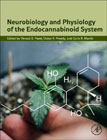
Neurobiology and Physiology of the Endocannabinoid System
Patel, Vinood B.
Preedy, Victor R.
Martin, Colin R.
Neurobiology and Physiology of the Endocannabinoid System offers readers a comprehensive reference on the neurobiology of this system and the use of cannabimimetic compounds to induce neurological changes and confer symptom relief. With sections on both natural and synthetic compounds, the book's broad coverage allows readers to learn about their use with multiple conditions, as well as the working biology of the endocannabinoid system, its receptors and its ligands. This volume provides a platform for research on the effects of this system and its modulation in brain function and neurological dysfunction. Summarizes research on the working neurobiology of the endocannabinoid system Contains chapter abstracts, key facts, a dictionary and a summary Covers both natural cannabinoids and synthetic or exogenous cannabimimetics Includes conditions like headache, anxiety, stress and neuroinflammation Discusses system modulation in the context of pain, traumatic brain injury and obesity INDICE: Section 1: Setting the Scene 1. The endocannabinoid system: a brief narrative 2. Endocannabinoids in brain tissue 3. Endocannabinoids in plasma 4. Metabolism of endocannabinoids: ABHD6 and beyond Section 2: Neurobiology of the Endocannabinoid System 5. Endocannabinoid receptor expression in the hypothalamus: impact of dietary fat 6. The endocannabinoid and dopaminergic systems 7. Endocannabinoid control of the insular-bed nucleus 8. The endocannabinoid system excitatory synapses and the dentate gyrus 9. Anandamide and DELTAfosB expression in the brain 10. 2-Arachidonyl glycerol, nitric oxide and the dorsomedial hypothalamus Section 3: CB1 and CB2 Receptors (Non-Exogenous and Synthetic) 11. Fatty acid amide hydrolase and striatal CB1 receptors 12. CB1 receptor allosteric modulator LDK1258 and behaviour 13. Neuronal features of CB1 receptor-deficiency 14. Alcohol, CB2 cannabinoid receptors and the mesocorticolimbic system 15. Adenosine A2A-cannabinoid CB1 receptor heteromers in the brain Section 4: Exogenous and Synthetic Pharmacology 16. Cannabidiol and endocannabinoid receptors: neuroscience perspectives 17. Tetrahydrocannabinol and CB1 and CB2 receptors: neuroscience perspectives 18. Novel carboxamide synthetic cannabinoids 19. Indole- and indazole-3-carboxamide synthetic cannabinoids and CB1 and CB2 receptors 20. The synthetic cannabimimetic win55,212-2 21. Synthetic cannabimimetics Section 5: Neurobiology of Cannabinoids 22. Tetrahydrocannabinol (THC) pharmacokinetic 23. 9-Tetrahydrocannabinol, anesthesia and the CB1 receptor 24. Cannabinoid receptor mechanism, oleamide protection and synaptosomes 25. Cannabinoid receptor 1 antagonists 26. Cannabinoid CB2 agonist, and human glial cell tumors 27. Cannabidiol (CBD), brain structure and epilepsy 28. Tetrahydrocannabinol, cannabidiol and intoxication effects 29. Tetrahydrocannabinol, brain development and neurotrophy 30. Cannabinoids and use in neurological disease: a focus on Parkinson's disease 31. Linking in cannabinoids, nicotine, the ventral tegmental and neurons Section 6: New Neuroactive Cannabinoids 5F-Cumyl-PINACA and a synthetic cannabinoid 32. 33. 5F-MDMB-PICA 34. APP-BINACA (or APP-BUTINACA), a novel synthetic cannabinoid Section 7: Physiological and Psychological Aspects 35. Cannabinoids and physiological regulation: cardiovascular and nervous systems and beyond 36. Impact of cannabinoids on the nervous system: cerebellar integrity and beyond 37. Psychological effects of cannabis Section 8: Pharmacological Aspects 39. Prescription guidelines for medicinal cannabis 40. Analysis of cannabinoids for pediatric pharmacokinetics 41. Cannabis-drug interactions
- ISBN: 978-0-323-90877-1
- Editorial: Academic Press
- Encuadernacion: Cartoné
- Páginas: 730
- Fecha Publicación: 01/06/2023
- Nº Volúmenes: 1
- Idioma: Inglés
